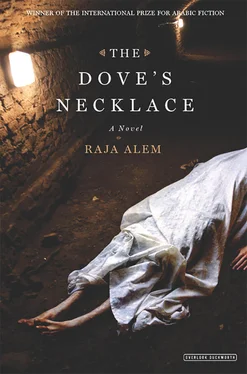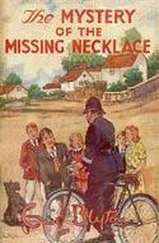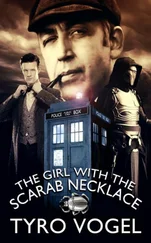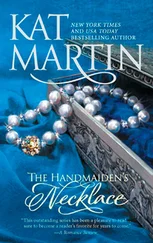A room eyed him from the middle of the storage area. It had to be Azza’s. When he pushed open the door, the room surprised him with its starkness, mocking his uniform and eavesdropping on his cement-muffled footsteps. There was no trace of life in the room: no personal belongings, no clothes, no forgotten handprints on the walls. A plastic wardrobe stood there, thin and split; a broken drawer poked out of it as if Azza’s entire life had been rent open. A hard cotton-stuffed mattress lay on a slightly elevated section of floor beneath the window. Nasser couldn’t catch his breath all of a sudden. The room was totally bare. It didn’t give off any feminine scent whatsoever. Nasser, who could sniff out a drop of sweat on a corpse, couldn’t detect the slightest whiff of perspiration, not even a stray hair fallen in a corner or stuck to the mattress. It was a stock scene wiped clean of any feminine traces. But even so, it aroused him: he dropped onto the bed, imagining Azza tied to its hard surface, and was immediately blinded by his erection. He closed his eyes, cursing himself. He forced his legs to heave his trembling body up off the bed and his mind to focus on the facts around him. The second call had sounded and the early afternoon prayers had begun; after just four cycles of standing, bowing, prostrating, and kneeling, Sheikh Muzahim would return to his shop. Nasser examined the window again. Someone had ripped out the wooden crossbeams in the window, leaving only the rusty nails behind. Yusuf had written in his diary that the window was nailed shut and was never opened. Had Azza been killed and thrown out of this broken window?
Nasser knelt down and lifted the edge of the thick cotton mattress to find a hollow storage area underneath. From inside the hollow, Batman stared back at him from the cover of an old comic, yellowed from having to hear the desolation in that room and the alley outside for such a long time.
Nasser heaved the mattress onto his shoulder and bent down to see what else the drawer contained. Suddenly, a body landed on top of the mattress, burying him beneath it. Nasser’s face was slammed up against Batman’s, and he felt a pair of sticky knees ram into his back before the attacker fled, yanking the door open with a bang and making off like a flash into the storehouse outside. The taste of blood filled Nasser’s throat and nose. For a moment he felt like his neck had been wrung like a chicken’s, that his face was covered in blood like Batman’s mask. Terror rooted him to the spot. Looking around him, he could see no trace of anyone, only the unsettled air in the room and the open door. Too late, he bolted after his attacker, and had to stop, confused, surrounded by the different storage rooms, all of whose doors were open and whose dusty thresholds bore no footprints. Small prints like those of goats’ hooves led Nasser to the last room, which looked like an old bathroom. The door was ajar, strengthening Nasser’s suspicions. He attempted to squeeze through the opening, into the fetid darkness of the room, but the door was blocked by a pile of sacks behind it, and the opening was too narrow for a human to pass through.
A hubbub from the mosque speakers suggested that prayers had ended, and that Nasser ought to leave right away, but a sudden movement in the deepest dark of one corner of the room caught his attention. It came from behind some sacks of coal. He thrust his head through the narrow opening in the door, half-expecting a blow to knock it right off his shoulders, but the eye peering fierily out at him was only that of an enormous rat, a Lane of Many Heads rat, which began nibbling hysterically at something. Nasser’s eyes widened in disgust as a mocking laugh filtered into the shop from the alley outside. It was only Imam Dawoud’s salutation announcing the end of prayers that finally forced Nasser to extricate himself from Sheikh Muzahim’s storeroom. The Sudanese cashier at the cafe gave the detective a derisive look as he burst out into the afternoon sun, his face bloodied and his eyes chasing a specter.
Hurrying down the alley, Nasser was no longer certain what had happened inside Muzahim’s shop. Had Azza stashed Batman under her mattress so as to distract the police dog inside of him with a hunk of poisoned meat?
Over the two decades that Nasser had toiled away to earn and keep his reputation as a first-class criminal detective, he had developed his own theories about how to analyze negative phenomena encountered in investigating crime scenes and how to put seemingly illogical clues to use.
Like a police dog, Nasser had trained his intuition to seek out the characters who left no trace. For him, a blank spot where there should have been fingerprints merely confirmed the existence of a killer. He felt that a criminal’s sweat and breath were like weathering agents that always left a faint trace, and that he could read those traces. This led to rumors among his colleagues that he sought the assistance of genies to help him solve tricky cases, as some intelligence agencies were known to do. Their proof was the circle that presided over his noticeboard. He began every investigation by drawing a circle: a dot in the center represented the victim, and concentric circles spiraled out around it. He would usually begin with the characters who had fled to the furthest points on the periphery, and his excitement would grow as he searched for the hidden threads that linked them back to the center and thus to the victim. It was just a plain old circle, but it amazed his staff: they were convinced it was magic.
Nasser could have sat in the cafe forever, going back and forth over that magic circle. What perplexed him in this case was that the center was missing; it goaded all his police instincts. He couldn’t leave it empty so in the center he wrote “Lane of Many Heads”—me, the victim! And on the periphery, the spot furthest from any suspicion, he was again at a loss so he put “Lane of Many Heads” there too! Nasser leaned back and surveyed his ingenuity: the criminal and the dead woman were both me, the Lane of Many Heads. Though the symmetry of it invited ridicule, I must admit I was flattered nonetheless. I felt it meant something that I’d succeeded in adding a little spice to the stifling lethargy around this Nasser fellow.
Nasser distributed dots around the concentric circles, which represented the people and houses he would rely on to reconstruct the Lane of Many Heads case. He built his case around the eternal axis of Eve’s role in the fall from Paradise: he paid special attention, therefore, to women and their involvement in the issue at hand. Azza and Aisha, for example, he left floating between the center of the circle and the area of suspicion, owing to the secrecy and denial that surrounded their simultaneous disappearance from the neighborhood — not to mention the abundance of documents written about both these women. Detective Nasser began a mental list of the various small signs that pointed to them, and he added these to the copious amount of information linking them to the other concentric circles and to the center of the crime. A passing reference in Yusuf’s diaries brought him up short: Yusuf had described Aisha as being “cold.”
What made her cold? Being “cold,” to Nasser, meant something sexual: a woman who couldn’t even charm her own reflection in a mirror. Nasser’s canine instincts warned him not to get distracted, but for the man inside him it was too late. He began searching Yusuf’s diaries for evidence of the coldness he’d mentioned:
October 12, 2004
I’m dropping Aisha. I’m kicking her out of my diary. I’m not going to write about her, because she’s cold. For me, she is dead, was dead, long before the rest of her family. Sometimes I imagine that she’s reached the age that tightens around people like a snare. I doubt she reads, despite all the books she beat me to, or that she even writes, although she used to be a teacher. Aisha’s like a box of words. Aisha is obsessed with cleanliness these days, but she’s still engraved upon the mind of the neighborhood as the fish-girl: we would wait, barefoot, for her to get off the schoolgirls’ bus and follow the odor of dried fish emanating from her. We would watch the heel of her left foot carefully, looking for the fine thread of blood we’d noticed one day staining her socks red. We all knew she’d got her period before the other girls in the Lane of Many Heads, who eventually turned the school bus into a can of dried fish.
Читать дальше












